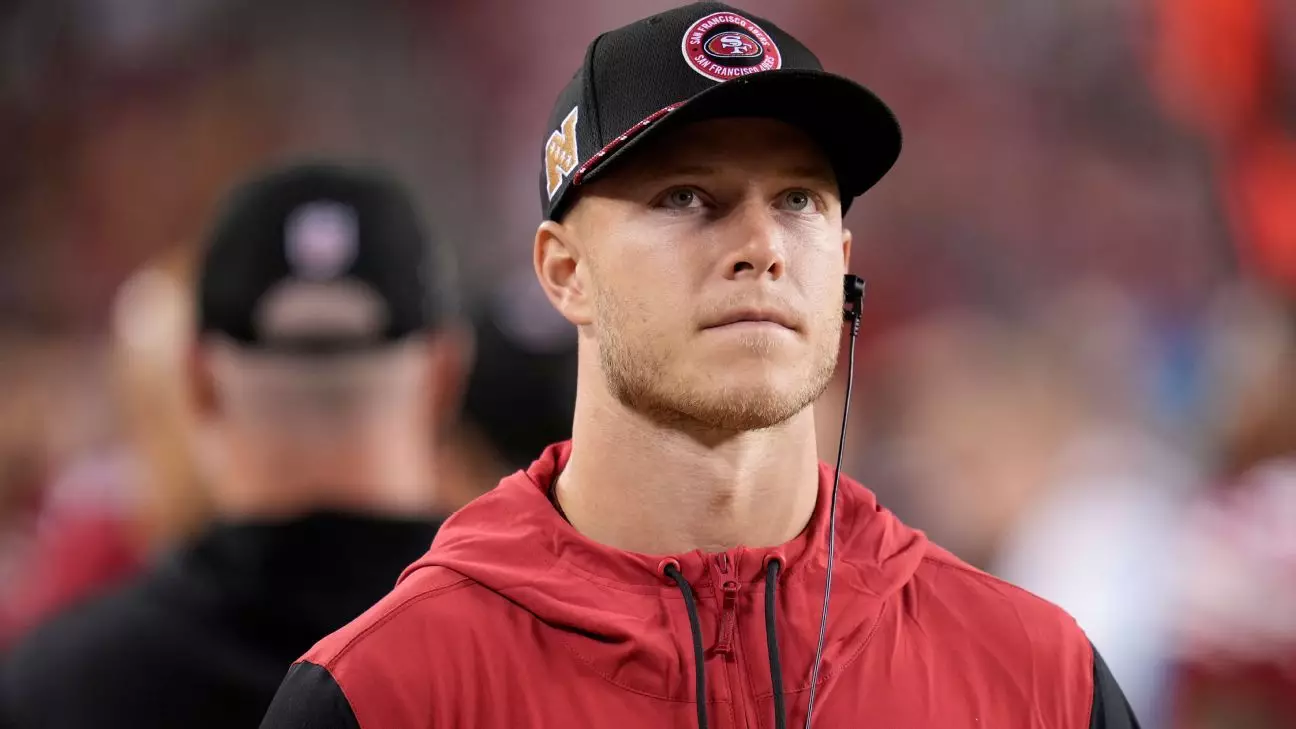In professional sports, injuries are an unfortunate yet inevitable reality. The latest development surrounding the San Francisco 49ers and their star running back, Christian McCaffrey, exemplifies how a single injury can reverberate through an entire team’s strategy and morale. With McCaffrey now on injured reserve due to calf soreness and Achilles tendinitis, it is imperative to analyze the implications of this setback, both for him personally and for the 49ers as a team.
Injuries are an integral part of the game, and the NFL is notorious for its high injury rates. Players often face a tough decision between pushing through pain and maintaining their health for the long term. In the case of McCaffrey, his injury has once again revealed the unpredictability that often accompanies NFL player health. Head coach Kyle Shanahan acknowledged this unpredictability, describing McCaffrey’s condition as a fluctuating challenge, with good days followed by painful setbacks. This kind of inconsistency not only complicates a player’s ability to return but also makes it difficult for the coaching staff to devise effective game plans.
One aspect that stands out is McCaffrey’s history with injuries, particularly when he was with the Carolina Panthers, struggling with multiple ailments over a two-year span. The physical demands of the NFL can accumulate on a player’s body, especially for someone like McCaffrey, who has been the centerpiece of his team’s offensive strategy. Thus, placing him on injured reserve may seem like a logical choice to mitigate the risk of further complications. However, it also raises questions about how much longer he can sustain high-performance levels without encountering similar issues.
With McCaffrey sidelined, the San Francisco 49ers must adapt their game plan and find new ways to distribute offensive responsibilities. Jordan Mason, who stepped up in the absence of McCaffrey, demonstrated his capabilities with impressive statistics against the New York Jets, showcasing his potential to handle the primary running back duties. Nevertheless, the 49ers’ coaching staff now faces the challenge of adequately preparing Mason and supporting players to fill the void left by McCaffrey.
Mason’s early success can inject fresh energy into the roster, but it is vital to recognize the inherent risks associated with asking less experienced players to shoulder the load. Meanwhile, versatile players such as Deebo Samuel demonstrate how multifaceted strategies can compensate for the loss of a star player. Samuel’s services as a backup running back may alleviate the pressure on the primary runners, but it also requires careful management to avoid placing undue stress on his own body.
Beyond the tactical adjustments, McCaffrey’s injury carries psychological implications for him and his teammates. His determination to play despite ongoing pain shows a strong will and commitment to the team. However, the disappointment of being sidelined could affect his morale, particularly given that he was expected to be a crucial element in this season’s offensive blueprint. McCaffrey’s sentiment of seeing the situation as a “chess move” reflects an understanding of the bigger picture, but it doesn’t negate the frustration and heartache that many players feel when they cannot contribute on the field.
For the team’s dynamics, the absence of a key player can create tension and uncertainty. Players usually rally around their teammate’s efforts, and when that effort is hampered by injury, it can shake the foundation of teamwork. The 49ers must cultivate an environment where players feel empowered to step up without dwelling on what is lost with McCaffrey’s absence.
As the San Francisco 49ers navigate this challenging period, the focus will inevitably turn towards how they can regroup and move forward effectively. The team needs to optimize their depth and versatility, learning to adapt in McCaffrey’s absence while keeping an eye on his return for future games, including the anticipated matchup against the Seattle Seahawks. The experience gained during this phase can be invaluable if it helps develop the resilience necessary for the long season that lies ahead.
While injuries are part of the narrative that defines NFL seasons, the way teams respond and evolve in the face of adversity speaks volumes about their character and potential. The management of players like Christian McCaffrey encapsulates the intricate balance between health, performance, and mental resilience—a balance that can make or break a season.


Leave a Reply